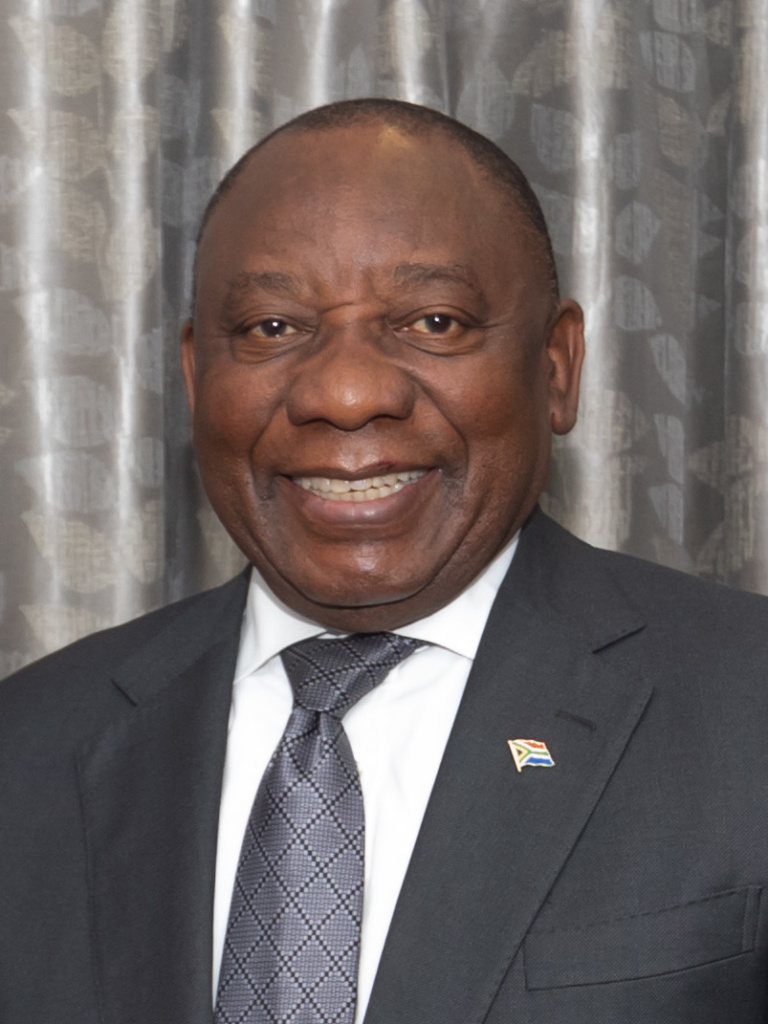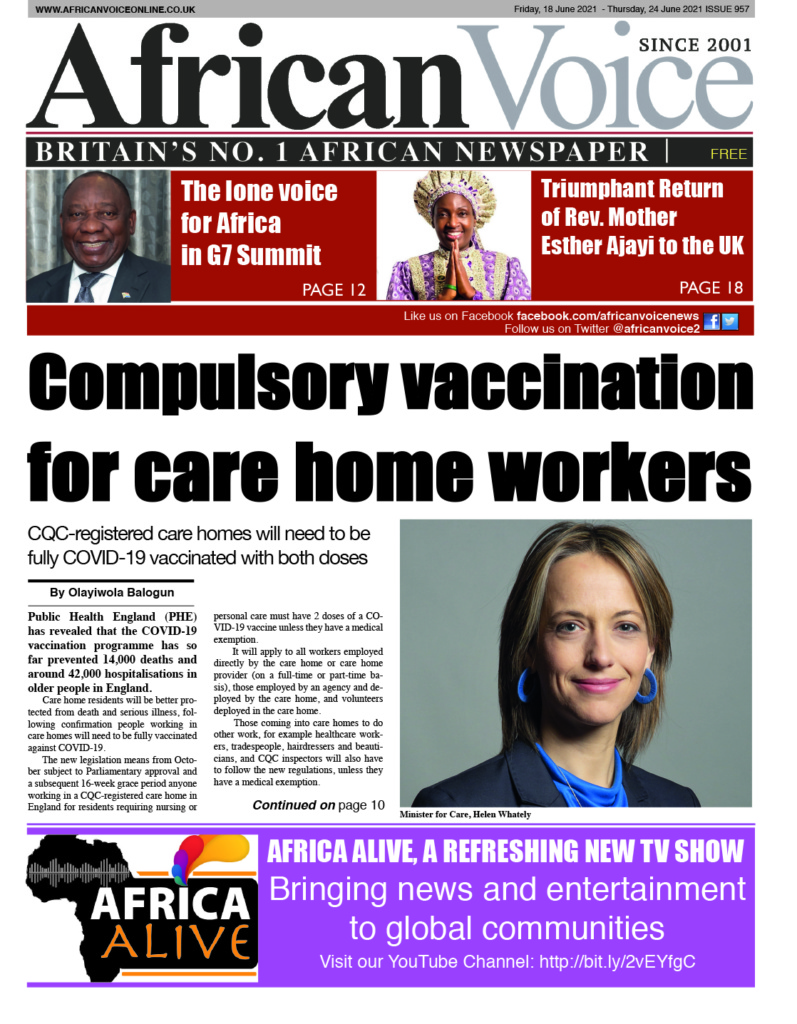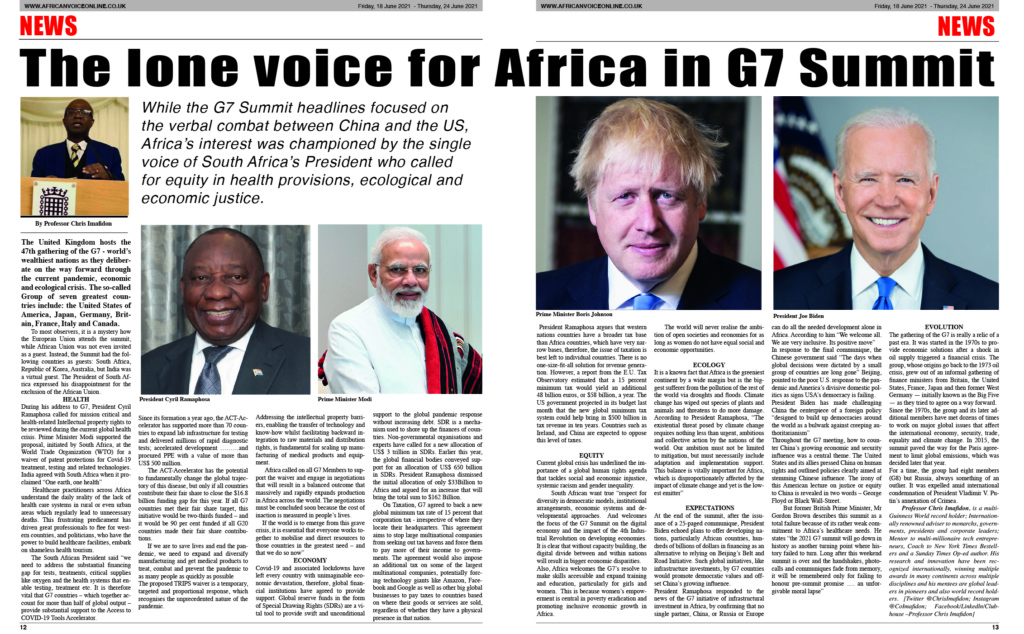
While the G7 Summit headlines focused on the verbal combat between China and the US, Africa’s interest was championed by the single voice of South Africa’s President who called for equity in health provisions, ecological and economic justice.
By Prof. Chris Imafidon – The United Kingdom hosts the 47th gathering of the G7 – world’s wealthiest nations as they deliberate on the way forward through the current pandemic, economic and ecological crisis. The so-called Group of seven greatest countries include: the United States of America, Japan, Germany, Britain, France, Italy and Canada. To most observers, it is a mystery how the European Union attends the summit, while African Union was not even invited as a guest. Instead, the Summit had the following countries as guests: South Africa, Republic of Korea, Australia, but India was a virtual guest. The President of South Africa expressed his disappointment for the exclusion of the African Union.

HEALTH
During his address to G7, President Cyril Ramaphosa called for mission critical and health-related Intellectual property rights to be reviewed during the current global health crisis. Prime Minister Modi supported the proposal, initiated by South Africa, at the World Trade Organization (WTO) for a waiver of patent protections for Covid-19 treatment, testing and related technologies. India agreed with South Africa when it proclaimed “One earth, one health”
Healthcare practitioners across Africa understand the daily reality of the lack of health care systems in rural or even urban areas which regularly lead to unnecessary deaths. This frustrating predicament has driven great professionals to flee for western countries, and politicians, who have the power to build healthcare facilities, embark on shameless health tourism.
The South African President said “we need to address the substantial financing gap for tests, treatments, critical supplies like oxygen and the health systems that enable testing, treatment etc. It is therefore vital that G7 countries – which together account for more than half of global output – provide substantial support to the Access to COVID-19 Tools Accelerator.
Since its formation a year ago, the ACT-Accelerator has supported more than 70 countries to expand lab infrastructure for testing and delivered millions of rapid diagnostic tests; accelerated development ………and procured PPE with a value of more than US$ 500 million.
The ACT-Accelerator has the potential to fundamentally change the global trajectory of this disease, but only if all countries contribute their fair share to close the $16.8 billion funding gap for this year. If all G7 countries met their fair share target, this initiative would be two-thirds funded – and it would be 90 per cent funded if all G20 countries made their fair share contributions.
If we are to save lives and end the pandemic, we need to expand and diversify manufacturing and get medical products to treat, combat and prevent the pandemic to as many people as quickly as possible
The proposed TRIPS waiver is a temporary, targeted and proportional response, which recognises the unprecedented nature of the pandemic.
Addressing the intellectual property barriers, enabling the transfer of technology and know-how whilst facilitating backward integration to raw materials and distribution rights, is fundamental for scaling up manufacturing of medical products and equipment.
Africa called on all G7 Members to support the waiver and engage in negotiations that will result in a balanced outcome that massively and rapidly expands production in Africa across the world. The negotiations must be concluded soon because the cost of inaction is measured in people’s lives.
If the world is to emerge from this grave crisis, it is essential that everyone works together to mobilise and direct resources to those countries in the greatest need – and that we do so now”
ECONOMY
Covid-19 and associated lockdowns have left every country with unimaginable economic devastation, therefore, global financial institutions have agreed to provide support. Global reserve funds in the form of Special Drawing Rights (SDRs) are a vital tool to provide swift and unconditional support to the global pandemic response without increasing debt. SDR is a mechanism used to shore up the finances of countries. Non-governmental organisations and experts have called for a new allocation of US$ 3 trillion in SDRs. Earlier this year, the global financial bodies conveyed support for an allocation of US$ 650 billion in SDRs. President Ramaphosa dismissed the initial allocation of only $33Billion to Africa and argued for an increase that will bring the total sum to $162 Billion.
On Taxation, G7 agreed to back a new global minimum tax rate of 15 percent that corporation tax – irrespective of where they locate their headquarters. This agreement aims to stop large multinational companies from seeking out tax havens and force them to pay more of their income to governments. The agreement would also impose an additional tax on some of the largest multinational companies, potentially forcing technology giants like Amazon, Facebook and Google as well as other big global businesses to pay taxes to countries based on where their goods or services are sold, regardless of whether they have a physical presence in that nation.
President Ramaphosa argues that western nations countries have a broader tax base than Africa countries, which have very narrow bases, therefore, the issue of taxation is best left to individual countries. There is no one-size-fit-all solution for revenue generation. However, a report from the E.U. Tax Observatory estimated that a 15 percent minimum tax would yield an additional 48 billion euros, or $58 billion, a year. The US government projected in its budget last month that the new global minimum tax system could help bring in $500 billion in tax revenue in ten years. Countries such as Ireland, and China are expected to oppose this level of taxes.
EQUITY
Current global crisis has underlined the importance of a global human rights agenda that tackles social and economic injustice, systemic racism and gender inequality.
South African want true “respect for diversity in democratic models, institutional arrangements, economic systems and developmental approaches. And welcomes the focus of the G7 Summit on the digital economy and the impact of the 4th Industrial Revolution on developing economies. It is clear that without capacity building, the digital divide between and within nations will result in bigger economic disparities.
Also, Africa welcomes the G7’s resolve to make skills accessible and expand training and education, particularly for girls and women. This is because women’s empowerment is central in poverty eradication and promoting inclusive economic growth in Africa.
The world will never realise the ambition of open societies and economies for as long as women do not have equal social and economic opportunities.
ECOLOGY
It is a known fact that Africa is the greeniest continent by a wide margin but is the biggest sufferer from the pollution of the rest of the world via droughts and floods. Climate change has wiped out species of plants and animals and threatens to do more damage. According to President Ramaphosa, “The existential threat posed by climate change requires nothing less than urgent, ambitious and collective action by the nations of the world. Our ambition must not be limited to mitigation, but must necessarily include adaptation and implementation support. This balance is vitally important for Africa, which is disproportionately affected by the impact of climate change and yet is the lowest emitter”
EXPECTATIONS
At the end of the summit, after the issuance of a 25-paged communique, President Biden echoed plans to offer developing nations, particularly African countries, hundreds of billions of dollars in financing as an alternative to relying on Beijing’s Belt and Road Initiative. Such global initiatives, like infrastructure investments, by G7 countries would promote democratic values and offset China’s growing influence.
President Ramaphosa responded to the news of the G7 initiative of infrastructural investment in Africa, by confirming that no single partner, China, or Russia or Europe can do all the needed development alone in Africa. According to him “We welcome all. We are very inclusive. Its positive move”
In response to the final communique, the Chinese government said “The days when global decisions were dictated by a small group of countries are long gone” Beijing, pointed to the poor U.S. response to the pandemic and America’s divisive domestic politics as signs USA’s democracy is failing.
President Biden has made challenging China the centerpiece of a foreign policy “designed to build up democracies around the world as a bulwark against creeping authoritarianism”
Throughout the G7 meeting, how to counter China’s growing economic and security influence was a central theme. The United States and its allies pressed China on human rights and outlined policies clearly aimed at stemming Chinese influence. The irony of this American lecture on justice or equity to China is revealed in two words – George Floyd or Black Wall-Street.
But former British Prime Minister, Mr Gordon Brown describes this summit as a total failure because of its rather weak commitment to Africa’s healthcare needs. He states “the 2021 G7 summit will go down in history as another turning point where history failed to turn. Long after this weekend summit is over and the handshakes, photocalls and communiques fade from memory, it will be remembered only for failing to honour pre-summit promise …. an unforgivable moral lapse”
EVOLUTION
The gathering of the G7 is really a relic of a past era. It was started in the 1970s to provide economic solutions after a shock in oil supply triggered a financial crisis. The group, whose origins go back to the 1973 oil crisis, grew out of an informal gathering of finance ministers from Britain, the United States, France, Japan and then former West Germany — initially known as the Big Five — as they tried to agree on a way forward.
Since the 1970s, the group and its later additional members have met dozens of times to work on major global issues that affect the international economy, security, trade, equality and climate change. In 2015, the summit paved the way for the Paris agreement to limit global emissions, which was decided later that year.
For a time, the group had eight members (G8) but Russia, always something of an outlier. It was expelled amid international condemnation of President Vladimir V. Putin’s annexation of Crimea.
Professor Chris Imafidon, is a multi-Guinness World record holder; Internationally renowned adviser to monarchs, governments, presidents and corporate leaders; Mentor to multi-millionaire tech entrepreneurs, Coach to New York Times Bestellers and a Sunday Times Op-ed author. His research and innovation have been recognized internationally, winning multiple awards in many continents across multiple disciplines and his mentees are global leaders in pioneers and also world record holders. [Twitter @ChrisImafidon; Instagram @CoImafidon; Facebook/Linkedln/Clubhouse –Professor Chris Imafidon]
Kindly follow us on twitter:@AfricanVoice2










